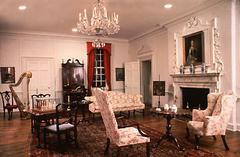Curriculum Materials: Art in America
|
|
Image 3 Charleston, South Carolina Questions: |
Charleston Drawing Room
This drawing room served as a formal reception room for the house and a ballroom for entertaining. When the room was not in use, the furniture was placed against the walls. The wall with the fireplace, which is the focal point of the room, is more decorated than the others. The elaborate MOLDING surrounding the picture over the mantle and the BROKEN PEDIMENT over the doorway are examples of British ROCOCO design. Rococo designs incorporated CLASSICAL MOTIFS and decorative curving elements like the S-scrolls at the top of the molding.
The furnishings, like the architecture, reveal British influence. Although made in the colonies, some of the furniture emulates the style of British designer Thomas Chippendale. For example, some of the gracefully curved legs end in ball-and-claw feet, and intricate pierced details decorate the SPLAT backs of some of the chairs. Most of the wood is mahogany, an expensive imported wood favored for English furniture at this time. The upholstered sofa and chairs offered great comfort to the sitter. The upholstery matches the curtains, as was often true in fashionable homes.
Many items decorating the room provide insight into the tastes of this period. Fashionable porcelain vases imported from China are arranged on the mantle. A formal PORTRAIT of the Stuart family or a family member probably hung above the fireplace. (The portrait hanging there today is not originally from the room.) To the left of the fireplace is an embroidered pole screen used to shield women's faces so the fire's heat would not melt their wax-based makeup. The large cut-glass chandelier, wired for electricity today, held candles in the 18th century. Candles were very expensive at the time, however, and were used with great economy.
In the museum, the drawing-room furniture is arranged for
tea and conversation. The harp, chess set, pen and paper,
and tea service illustrate some of the leisure activities
available to the Stuart family and their friends. Tea was
the most popular social beverage of the day, and serving tea
was a mark of hospitality (see Templeman
Tea Service). This ceramic tea service imported from
England imitates Chinese porcelain.
|
|
